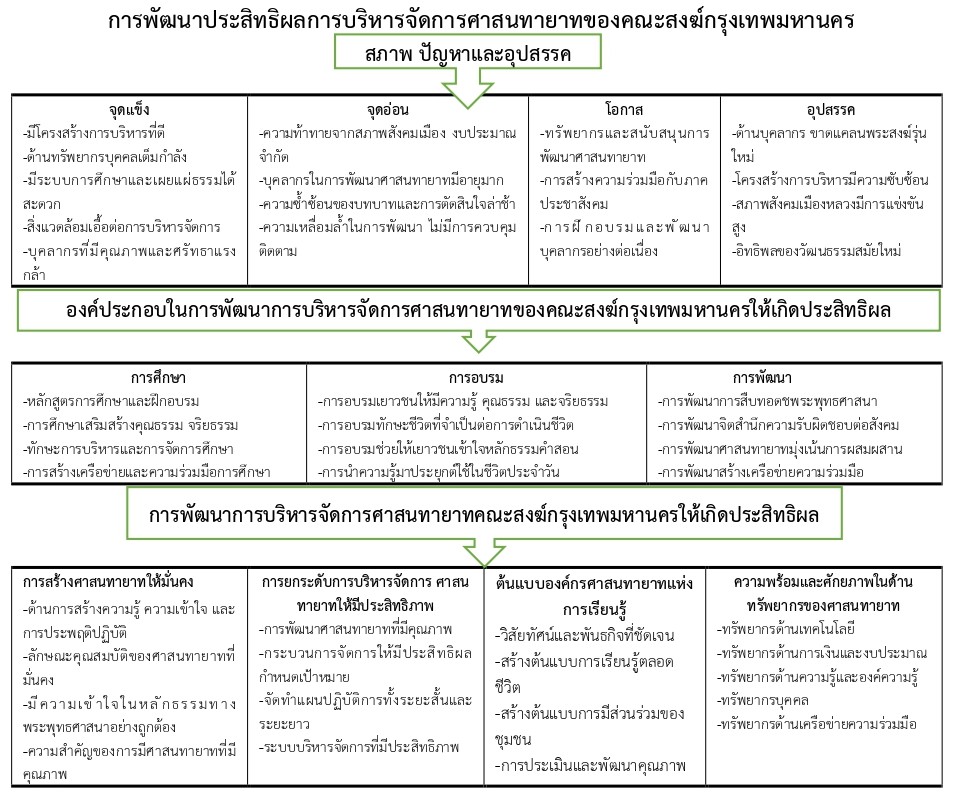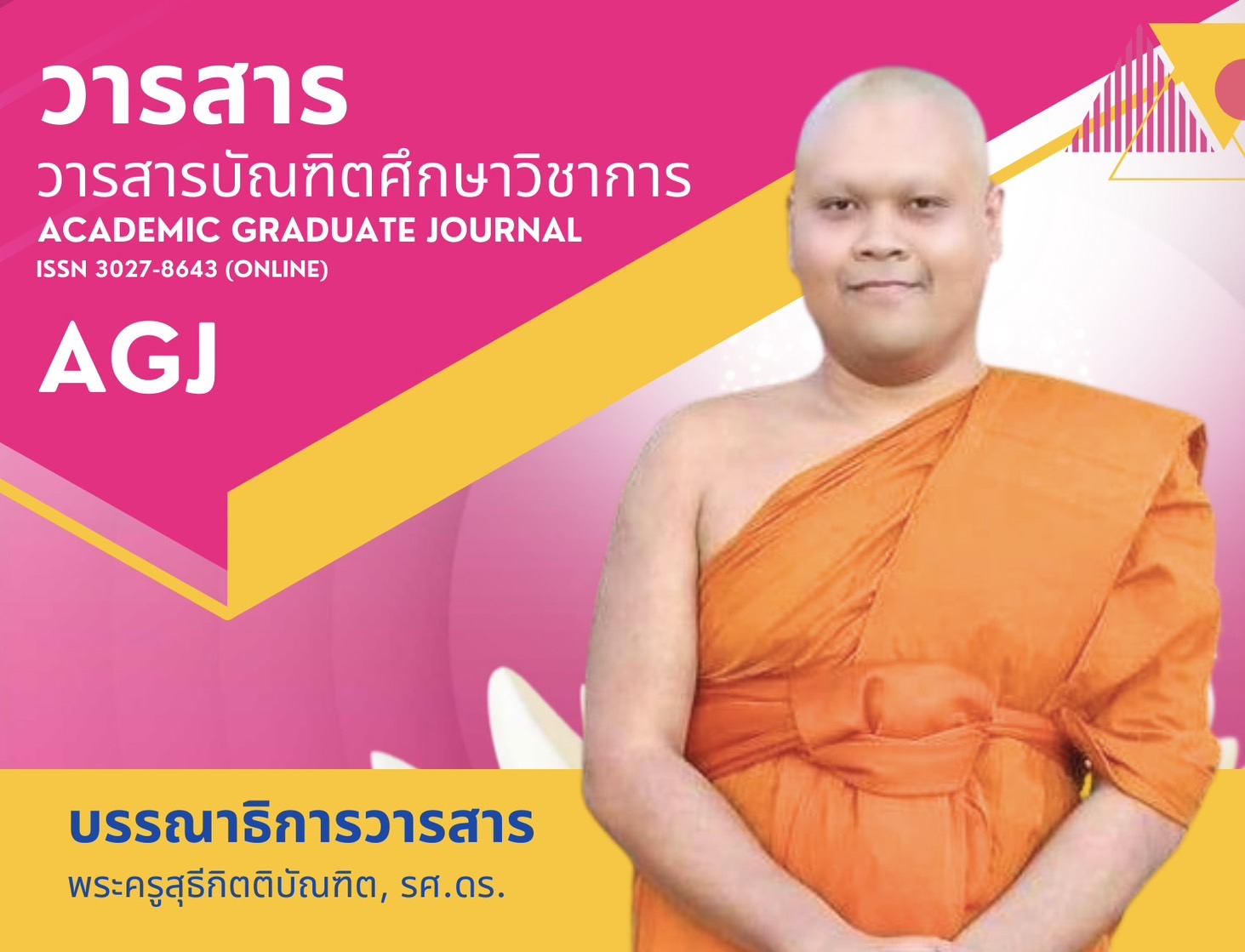DEVELOPMENT OF RELIGIOUS SUCCESSOR MANAGEMENT OF SANGHA IN BANGKOK METROPOLIS
Keywords:
Effectiveness Development, Management, Religious Heirs the SanghaAbstract
The objectives of this research article were: 1. To study the current conditions problems, and obstacles in the management of heirs of Buddhism of the Sangha in Bangkok 2. To examine the components for developing effective management of the heirs of Buddhism of the Bangkok Sangha and 3. To investigate the processes for developing effective management of the heirs of Buddhism of the Bangkok Sangha. This is a qualitative study, collecting data from 25 key informants and 9 participants in focus group discussions selected through purposive sampling. The data were analyzed using descriptive interpretation.
The results of the research were found: 1. Current conditions, problems, and obstacles: The Bangkok Sangha had a strong organizational structure with numerous monasteries and educational centers, sufficient resources and supportive capacity. It was also able to utilize modern technology in disseminating Buddhism. However, six major problems were identified: the declining number of religious successors, educational challenges, insufficient budget, issues in quality and behavior of some religious successors, limited reach of dissemination and internal administrative constraints. 2.Components of effective management development; effective development of religious successors emphasized three main aspects; 1.Education integrating Buddhist knowledge with modern sciences, 2.Training cultivating morality, ethics, and leadership and 3).Development strengthening faith, life skills and the use of technology for Dhamma dissemination 3.Processes of effective management development. Four processes were identified, 1. Building religious successors with stability in Buddhism 2. Enhancing management processes to be more effective 3. Establishing religious successors organizations as learning models and 4. Ensuring readiness and capacity in resource development to achieve this. The Bangkok Sangha should establish a clear Master Plan implement monitoring and evaluation systems.
References
ปวีณา อุดมสถาผล และ พระปราโมทย์ วาทโกวิโท. (2566). การพัฒนาศาสนทายาทเพื่อรักษาพระพุทธศาสนาโดยพุทธสันติวิธี: ศึกษากรณีวัดธรรมมงคลเถาบุญนนทวิหารกรุงเทพมหานคร. วารสารสันติศึกษาปริทรรศน์ มจร, 11(7), 2963-2977.
พระครูธวัชอินทวงศ์ (สกล อินฺทวํโส) (2556). (ศึกษาประสิทธิผลของการเรียนการสอนวิชาพระพุทธศาสนาของพระสอนศีลธรรมในโรงเรียนเวฬุวันวิทยา ตำบลหนองไผ่ อำเภอธวัชบุรี จังหวัดร้อยเอ็ด). (วิทยานิพนธ์พุทธศาสตรมหาบัณฑิต สาขาวิชาพระพุทธศาสนา). พระนครศรีอยุธยา: มหาวิทยาลัยมหาจุฬาลงกรณราชวิทยาลัย.
พระครูปลัดสุวัฒนจริยคุณ. (2547). วิชาการเทศนา. กรุงเทพฯ: โรงพิมพ์สำนักงานพระพุทธศาสนาแห่งชาติ.
พระธรรมปิฎก (ป.อ.ปยุตฺโต). (2545). ภัยแห่งพระพุทธศาสนาในประเทศไทย. กรุงเทพฯ: บริษัท สื่อตะวัน จำกัด.
พระไพศาล วิสาโล. (2546). พุทธศาสนาไทยในอนาคตแนวโน้มและทางออกจากวิกฤต. กรุงเทพฯ: มูลนิธิสดศรีสฤษดิ์วงศ์.
พระมหาทวี วิสารโท. (2560). การบวชเป็นศาสนทายาทในพุทธศาสนาแบบเถรวาท. วารสาร มจร สังคมศาสตร์ปริทรรศน์, 6(1), 15-24.
พระวรภพ คุณสมฺปนฺโน. (2566). การพัฒนาศาสนทายาทต้นแบบของคณะสงฆ์ จังหวัดปทุมธานี, วารสาร มจร สังคมศาสตร์ปริทรรศน์, 12(4), 259-270.
มหาจุฬาลงกรณราชวิทยาลัย. (2539). พระไตรปิฎกฉบับภาษาไทย ฉบับมหาจุฬาลงกรณราชวิทยาลัย. กรุงเทพฯ: โรงพิมพ์มหาจุฬาลงกรณราชวิทยาลัย.
วิเชียร ชาบุตรบุณฑริก. (2535). พุทธศาสตร์. กรุงเทพฯ: โอ.เอส.พริ้นติ้ง เฮ้าส์.
สมเด็จพระญาณสังวร สมเด็จพระสังฆราช สกลมหาสังฆปริณายก (เจริญ สุวฑฺฒโน). (2547) รายงานผลการดำเนินงานกองทุนปลูกรากแก้วศาสนทายาท. กรุงเทพฯ: ร่มธรรมการพิมพ์.
สำนักงานพระพุทธศาสนาแห่งชาติ. (2551). พระวินัยและข้อปฏิบัติสำหรับพระภิกษุสามเณร. กรุงเทพฯ: โรงพิมพ์สำนักงานพระพุทธศาสนาแห่งชาติ.
หลง สมบุญ. (2546) พจนานุกรมมคธ-ไทย. กรุงเทพฯ: บริษัท ธรรมสาร จำกัด.







